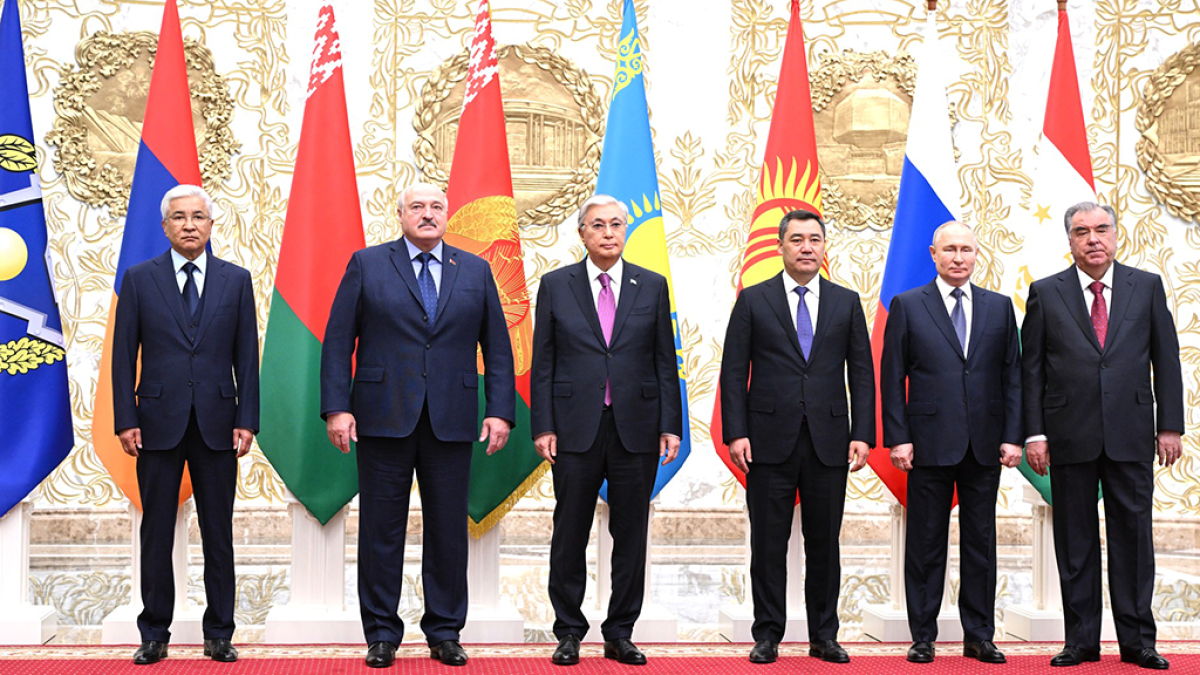This marks the first CSTO summit without Armenia's participation, as Prime Minister Nikol Pashinyan did not attend.

Heads of member countries of the Collective Security Treaty Organization (CSTO) participated in the summit on November 23 in Minsk, as reported by Sarbaz.kz. The summit commenced with an address by Belarusian President Alexander Lukashenko, summarizing Belarus's presidency this year.
"Today's session of the CSTO Council effectively concludes our Belarusian presidency in the organization. Formally, we will hand over the chairmanship to our Kazakh friends on December 31, 2023," stated Alexander Lukashenko.
The Belarusian leader emphasized that the CSTO remains an integral guarantor of security in the Eurasian region.
The agenda outlined issues of international and regional security. President Lukashenko mentioned that summit participants plan to analyze the primary trends in the contemporary military-political environment, considering the organization's areas of responsibility, both globally and regionally.
Kazakhstan's President Kassym-Jomart Tokayev outlined priorities for 2024, when the CSTO chairmanship transfers to Kazakhstan.
Tokayev highlighted the CSTO's plans to expand cooperation with international organizations and other countries in the security sphere. He proposed a focus on collaboration with the UN and its structures, referencing a 2010 cooperation declaration. Enhanced interactions with the Shanghai Cooperation Organisation (SCO) are also on the agenda.
Additionally, Tokayev urged the refinement of the legal framework concerning the deployment and transportation of CSTO troops, as well as Collective Rapid Reaction Forces (CRRF). Specifically, this refinement would encompass unhindered and non-stop transit of contingents and aviation flights.
Another crucial direction highlighted by Kazakhstan's President was the necessity to counter international terrorism and drug trafficking.
"Joint efforts should continue to prevent the departure of citizens from our countries intending to join terrorist groups. It's important to activate the mechanism for the search, detention, and extradition of individuals involved in terrorism and extremism," emphasized Tokayev.
"However, in my opinion, there's no need to constantly discuss the growing security threats to CSTO member states, even if they exist. After all, threats have always existed. This is the essence of the international community. Frequent statements on this topic create an illusion that we fear someone. Such statements could also lead, and it seems they are already leading, to a completely wrong interpretation. The Organization's rhetoric should be firm yet extremely respectful, considering the dignity of member states and their combined military-political potential and strength," stated Tokayev.
Russian President Vladimir Putin commended the CSTO member countries' efforts in strengthening allied relations based on mutual respect and the preservation of each other's interests.
According to Putin, the CSTO has significantly enhanced contacts with "natural partners" such as China and the CIS countries. He underscored the improvements in rapid response forces, aviation, and CSTO peacekeeping forces due to various exercises and increased cooperation between national armies. As an example of the results of developing collective forces, Putin mentioned Operation "Mercenary," aimed at disrupting channels for recruiting and evacuating citizens to participate in the activities of terrorist groups.
"Our countries, including Russia, do not tolerate terrorism in any of its manifestations," Putin emphasized.
During the leaders' session, the absence of Armenia was also discussed.
"Let's not hide this – we discussed the situation in the Caucasus and some dissatisfaction of one of the CSTO Council members. We came to a unanimous conclusion that problematic issues have always existed and will continue to exist. If we intend to resolve them, we should do so at the negotiating table. Not make demonstrative moves without cause. We expressed a certain opinion and hope that, most likely in St. Petersburg, at an economic event, we will see our Armenian friends," commented Lukashenko.
Kyrgyzstan's President Sadyr Japarov urged CSTO countries to unite to resolve the conflict in the Middle East.
"With deep concern, we are observing the situation in the Middle East and the humanitarian crisis in the Gaza sector. We call on the parties to take comprehensive measures to prevent casualties and violence against civilians, to swiftly cease hostilities, and immediately initiate a negotiation process," stated Sadyr Japarov.
Following the CSTO summit, 15 documents were signed, reported the organization's Secretary-General Imangali Tasmagambetov. Most agreements concerned staffing and operational issues within the organization. They included procedures for the CSTO forces' response to crises and the process for making collective decisions for deploying collective security forces.
It's worth noting that the day before, a joint meeting of the Council of Foreign Ministers, Defense Ministers, and Secretaries of Security Councils took place. During this session, Belarus's presidency was reviewed, and the military-political situation was discussed. Approved were projects of documents addressing a wide range of cooperation matters.